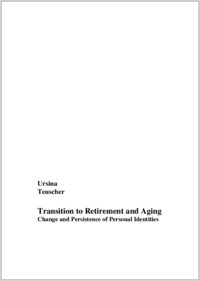Transition to retirement and aging : change and persistence of personal identities
- Teuscher, Ursina
- Retschitzki, Jean (Degree supervisor)
- Spini, Dario (Degree supervisor)
-
12.12.2003
247 p
Thèse de doctorat: Université de Fribourg, 2003
English
This doctoral thesis deals with the question of how self-images change when people are getting into the age of retirement. Two main issues are addressed regarding the development of personal identities in that life stage: (1) The content of identity: the question if and how retired people have a different way of defining or characterizing themselves than employed people. (2) The age identity (subjective age): the question of how old people feel, and what predictors and implications can be found for a younger or older age identity. Method: These issues have been addressed first with a preliminary inquiry where 13 persons aged 55-67 were interviewed face-to-face with open questions. Based on a qualitative analysis of the interviews, a standardized questionnaire was developed and sent to a random sample of 2000 citizens of Thun (Switzerland) aged 58-70. 792 persons participated in the survey. Results: (1) Identity content: The profession remained important for the participants’ self-description after retirement and was not replaced by a new identity as being retired. In general, the retired persons estimated more domains of self-description as important than did the not yet retired persons, which means that the identity diversity was higher for the retired than for the not yet retired persons. In addition, high identity diversity correlated with a high satisfaction across different life domains. This finding has important implications for psychological theories of older adults’ development, disproving strongly the view that disengagement be inherent to successful or even to normal aging. (2) Age Identity: A measurement model of subjective age was assessed and proved to have very good fit indices and a one-dimensional structure. Furthermore, it was shown that the general tendency to feel younger than one’s real age implies a motivational component and can therefore probably be seen as a special case of self-enhancement. This finding provides a possible theoretical framework for further research. To explore the relationships between various predictors and subjective age, a predictive structural model of subjective age was developed, including aspects of personality, behavior and body.
- Faculty
- Faculté des lettres et des sciences humaines
- Language
-
- English
- Classification
- Psychology
- License
-
License undefined
- Identifiers
-
- RERO DOC 4987
- URN urn:nbn:ch:rero-002-101961
- RERO R003601812
- Persistent URL
- https://folia.unifr.ch/unifr/documents/299759
Statistics
Document views: 410
File downloads:
- Texte intégral: 492
